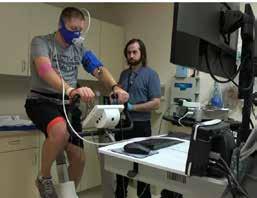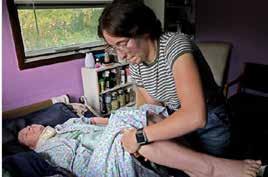
8 minute read
Solve M.E. This Quarter: Spring 2020
RESEARCH: Engaging the entire ME/CFS community and accelerating the discovery of safe and effective treatments.
Solve M.E. announced a partnership with the
Advertisement
UNIVERSITY OF CALIFORNIA, LOS ANGELES (UCLA) IRIS
CANTOR WOMEN’S HEALTH CENTER to issue an ME/ CFS-specific funding announcement through their Annual Health Pilot Program. They have a demonstrated record obtaining large National Institutes of Health (NIH) grants as follow-on to the pilot projects – approximately $27 million return on investment for $1 million invested.
Solve M.E. Chief Scientific Officer DR. SADIE WHITTAKER presented on the YOU + M.E. REGISTRY AND BIOBANK at the 6th Annual Science Conference held by the UK CFS/M.E. Research Collaborative (CMRC).
BHUPESH PRUSTY (PHD), ROBERT NAVIAUX (MD, PHD) and an international team published findings in ImmunoHorizons that Human Herpesvirus 6 (HHV-6) could be driving cellular energy production problems in at least some people with ME/CFS. CARMEN SCHEIBENBOGEN (MD, PHD) published a genetic association study that suggests an association between autoimmunity genetic risk variants and people with infectious onset ME/CFS in Frontiers in Immunology. Both of these studies received support from the Ramsay Grant Program.
In February 2020, Solve M.E. welcomed the newest member of the Research Department, ELLE SEIBERT, who will serve as Registry Data Manager for the You + M.E. Registry and Biobank.
SOLVE ME/CFS INITIATIVE PROFESSIONAL STAFF
Maryellen Gleason Interim President and CEO Sadie Whittaker, PhD Chief Scientific Officer Emily Taylor Director of Advocacy and Community Relations Jody Short Interim Director of Development Allison Ramiller, MPH Director of Research Programs Elle Seibert Registry Data Manager Deborah Saady Accounting and Operations Manager Karman Kregloe Communications and Media Relations Manager Shawnna Woolridge Communications and Media Relations Coordinator Jessica Brown-Clark Administrative Coordinator
ADVOCACY: Bringing government support, funding and public awareness to ME/CFS
SOLVE M.E. ADVOCACY WEEK activities in Washington, D.C. for the month of April were transitioned entirely to remote formats. The Solve M.E. team canceled inperson events to protect and preserve the health of our ME/CFS community in light of COVID-19.
Solve M.E Director of Advocacy and Community Relations Emily Taylor deployed an urgent advocacy action to secure 36 supporters of the ME/CFS funding requests in less than 18 hours. The co-sign letters, led by CONGRESSMAN BERGMAN and CONGRESSWOMEN ESHOO AND LOFGREN, called for $3m for the CDC to conduct a national ME/CFS epidemiological study.
Solve M.E. teamed up with local Florida advocates to launch a lightning advocacy action. CONGRESSMEN GUS BILIRAKIS and DARREN SOTO agreed to lead a Florida Congressional delegation to sign a letter to National Institutes of Health (NIH) Director Dr. Francis Collins urging more immediate action for research on ME/CFS.
In January, Solve M.E. celebrated SIX FEDERAL VICTORIES for our collective ME/ CFS advocacy efforts that will create real outcomes at federal agencies, such as the Centers for Disease Control and the National Institutes of Health.
Thanks to Solve M.E. advocacy efforts, ME/CFS researchers may now compete for five new funding streams and over 100 awards, with up to $7.2 million per award, from the Department of Defense CDMRP FUNDING program. The Program is slated to receive $350 million in 2020.
INFLUENCE AND EDUCATION: Providing trusted, up-to-date medical information, current research, & policy work on ME/CFS
Dr. Sadie Whittaker was quoted in a nationally-syndicated Associated Press (AP) story on the NIH INTRAMURAL STUDY, which profiled ME/CFS patientparticipant Zach Ault.
Solve M.E. formally submitted public comments to the SOCIAL SECURITY ADMINISTRATION (SSA) strongly urging a rejection of proposed rule in Docket SSA-2018-0026. The rule would create a new category for disability recipients that would increase the number of continuing disability reviews (CDRs).

Zach Ault of Paducah, KY is connected to monitors during an exercise test at the NIH Hospital as part of an intensive study on ME/ CFS.

In partnership with the Minnesota ME/ CFS Alliance, Solve M.E. Director of Advocacy and Community Relations EMILY TAYLOR was featured in the U.S. News & World Report article, “Western Wisconsin Residents Struggle With Chronic Illness.” n
Jamey Tuttle assists ME/CFS patient Deborah Smith at home in Wisconsin.
Each board member has ME or has a family member affected by this disease
Michael Atherton, Treasurer Arlington, VA
Andrea Bankoski Chapel Hill, NC
Victoria Boies, Vice-Chair Chicago, IL
Maryellen Gleason Alhambra,CA
William Hassler, Esq. Washington, DC
Carol Head Los Angeles, CA
Rona E. Kramer Olney, MD
Barbara Lubash, Secretary Corona del Mar, CA
John Nicols, Chair Redwood City, CA
Amrit Shahzad San Diego, CA
Rick Sprout Fairfax, VA
Janice Stanton Harrison, NY
Jeffrey Tobias Petaluma, CA
» from page 1
Could Improved Testing for Orthostatic Intolerance Lead to Better Clinical Care for People with ME/CFS? (cont’d)
a reduction in total CBF. The authors recruited 429 patients with ME/CFS (Fukuda and International Consensus Criteria classifications) and measured total CBF during a 30-minute head-up tilt test using extracranial Doppler imaging of carotid and vertebral arteries. During the tilt test, 247 patients had a normal heart rate and blood pressure response, 62 had delayed orthostatic hypotension (drop in blood pressure after being tilted upright), and 120 had POTS. Forty-four healthy controls were also assessed. Total CBF was measured before and after participants were placed in the upright position. Participants were also asked two sets of yes/no questions regarding their symptoms, one immediately after being placed in the upright position and another 10 minutes later.
Q&A 1: immediately after tilt
Did you develop, after being tilted: • complaints of dizziness or lightheadedness? • muscle weakness of your legs? • a feeling of dyspnea or breathlessness? • pain in the muscles of your neck or shoulders? • a feeling of nausea? • a tingling feeling in your right hand? • a feeling of chest pain or pressure on your chest? • low back pain? • palpitations? • a feeling of a pressure in your head or headache? Are you, after being tilted, more fatigued in comparison to when you were lying down? Is your vision less sharp since you have been tilted? Do you hear me differently, after being tilted, in comparison to when you were lying down? Are you less concentrated while standing, compared to when you were lying down? Did you start to sweat after being tilted?
Please visit the online version of The Chronicle at https://solvecfs.org/spring-2020-chronicle-1 to see Q&A 2: 10 minutes after being in upright position
FINDINGS
• Compared with healthy controls, patients with ME/CFS had an approximate 3-fold reduction in CBF while in the upright position • Patients with delayed orthostatic hypotension and those with POTS had the largest reduction in CBF • Almost all patients (90%) had an abnormal reduction in CBF, i.e., a more than 13% reduction in CBF • Abnormal reductions in CBF were seen in 3 subgroups of patients: » 82% with a normal heart rate and blood pressure response » 98% with delayed orthostatic hypotension » 100% with POTS • There was a significant correlation between degree of CBF decline and the number of OI symptoms that occurred during the tilt test • Patients who denied having symptoms of OI in daily life (but who had OI based on clinical signs) had reductions in CBF within the range experienced by patients with OI symptoms • Patients who had no OI symptoms had similar reductions in CBF to those of healthy controls
WHAT IS THE SIGNIFICANCE OF THESE FINDINGS? Van Campen and colleagues have shown that almost all patients with ME/CFS who report symptoms of OI during the tilt test have reductions in CBF. Importantly, this includes patients who report symptoms of OI but who have a normal heart rate and blood pressure response to the tilt test—the largest and most often misclassified group—as well as those who stated they had no symptoms of OI in daily life.
“The results of our study may explain why so many patients, including those considered “normal” in the head-up tilt test, cannot maintain an upright standing position and provides direction for treatments for OI. Getting this information out on a broad platform would help improve the way physicians look at OI symptoms in ME/CFS patients—hopefully.”
HOW WILL THESE FINDINGS BENEFIT PEOPLE WITH ME/CFS? The results of this study open the door to more accurate diagnosis and more effective treatments for ME/CFS. For example, treatments that increase blood volume can be tailored to patients who have reductions in CBF. With additional testing, extracranial Doppler during the head-up tilt test may become the gold standard for assessment of OI in patients with ME/CFS. n


Reduction in cerebral blood flow in patients with ME/CFS.
(A) Reduction in CBF at the end of the tilt test was significantly greater in patients with ME/ CFS than in healthy controls: 26% in the overall ME/CFS group (24% in patients with a normal heart rate and blood pressure response, 28% in those with delayed orthostatic hypertension, and 29% in those with POTS) versus 7% in healthy controls. The dotted bars represent mid-tilt; the hatched bars represent end-tilt.
(B) Most patients with ME/CFS had a greater than 13% reduction in CBF (abnormal blood flow).
Abbreviations: BP, blood pressure; dOH, delayed orthostatic hypotension; HR, heart rate; POTS, postural tachycardia syndrome.
Adapted from van Campen, C M.C. et al. Clin Neurophys Prac. 2020;5:50-58.
Anthony Komaroff, MD Simcox-Clifford-Higby Professor of Medicine, Harvard Medical School
Susan Levine, MD Founder, Medical Office of Susan M. Levine
Maureen Hanson, PhD Liberty Hyde Bailey Professor, Cornell University
Peter Rowe, MD Professor of Pediatrics, Johns Hopkins University School of Medicine
Lucinda Bateman, MD Founder & Chief Medical Officer, Bateman Horne Center
Rochelle Joslyn, PhD Immunologist, Independent Consultant
Sheila Stewart, PhD Associate Professor, Washington University School of Medicine
Daan Archer, MBA, MSc Technology Entrepreneur
John Nicols, MBA President & CEO, Codexis Inc.
Morgan Fairchild Actress and Activist
Ex Officio Members
Maryellen Gleason, MBA Interim President & CEO, Solve M.E.
Sadie Whittaker, PhD Chief Scientific Officer, Solve M.E.




